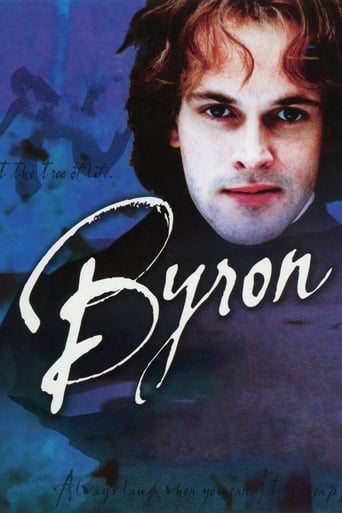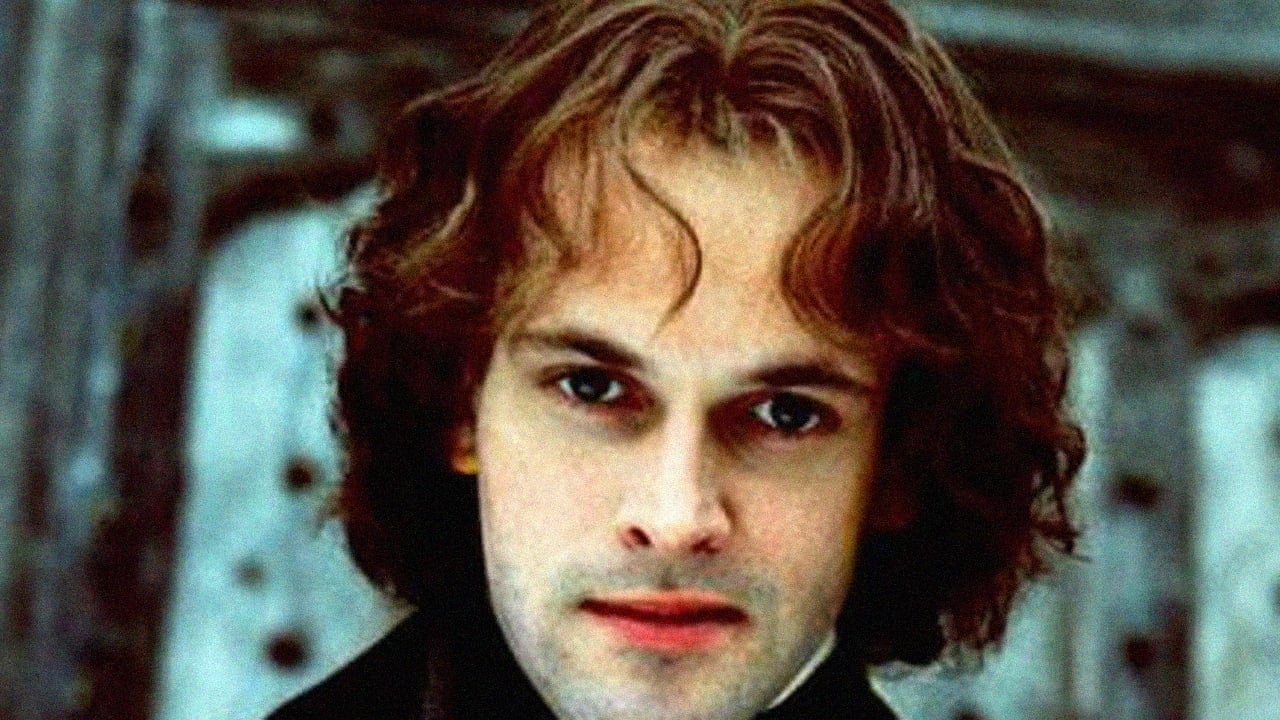bkoganbing
In the end how do you judge a man like George Gordon Byron? He certainly left
a nice body of work to judge him as writer and poet. It might have been more had
he spent a little more time at creation and less indulging every kind of vice there
was. As he puts it so accurately pleasure is the only real reason we know we're
alive.This film covers the period of 1812 to 1824 from the publication of Childe Harold's Pilgrimage until his death. He's quite the toast of Regency London
and he's welcome by dint of his work and title in the best of homes. He soon
wears out that welcome in a series of scandalous affairs. Regency society
didn't mind affairs, but just be discreet. Discreet did not exist in his vocabulary.Byron's personal life is probably best known for his affair with Lady Caroline
Lamb. But this film shows she's only one of many. Camilla Power plays her
and Power is in the film long enough to show what a mad woman she was.
A little too much for a lover and a husband to handle.I can't think of anything Byron missed. He made it with any woman who showed the slightest interest, even a little incest with a sister. He indulged himself in the love that dares not speak its name with a young boy. He drank to excess, took opiates at a rate that his contemporary Coleridge might have
envied. There's brief scene of him turtling down some Laudanum like it was a
brewski.I think he envied the Shelleys played here by Sally Hawkins and Oliver Dimsdale. Percy Bysshe Shelley and Mary Shelley were his contemporaries and they seemed to find happiness that was unattainable for Byron.Jonny Lee Miller plays the title role and makes Byron the last word in hedonism. He strikes just the right notes and pulls a lot of emotions from the
viewer. You envy him and yet you're jealous of him. He's rich with a title which allows him to indulge. We'd all like to be him, but the business of day to day living leaves 95% of us with enough challenges for our lives.This BBC production of Byron is both revealing and non-judgmental. It will
give you a good understanding of the man who in many ways was the symbol of the romantic age.
SimonJack
This BBC production on George Gordon Byron, 6th Baron Byron, isn't about the works of the renowned English poet and satirist, known widely as Lord Byron. Rather, its focus is on the life of the man. As such, it seems to do a very good job of showing a conflicted and tormented life that Byron lived. This is the story of a tortured soul who wrote about his own conflicts and failure to find fulfillment in pleasure. And it is about a witty, talented thinker and writer who could give us such classical satire as "Don Juan."I think a passage from the Encyclopedia Britannica describes well the varying views on Byron's place in letters. "Renowned as the 'gloomy egoist' of his autobiographical poem, "Childe Harold's Pilgrimage" (1812-18), in the 19th century, he is now more generally esteemed for the satiric realism of "Don Juan" (1819-24)." It was long ago that I read "Don Juan" and perhaps some small parts of other works or letters. So, I appreciated the review by Ginger Johnson (3 December 2005) who gave some information and points about the film as it depicted Byron's life. With the reviews I've read as of the time of my writing, I am surprised that no one has commented on Byron's background and upbringing. His is a classic tale (if, indeed, one can use the term in this context) of a broken home in childhood, with an abusive, negligent and then absent father. As a boy, he and his mother were a low-income family, and then at the age of 10 he had great wealth thrust upon him by inheritance. He grew up without discipline or responsibilities. He was extremely self- centered and selfish – what we might call "spoiled" today. Why is this worth pondering? Because, had he grown up in a healthy home with loving parents and some direction, there's a good chance that Bryon's life would not have been so tragic and short. And, we might have had the pleasure of more literary treasures today.The film covers mostly his last few years with his adultery, heavy drinking, and constant pursuits of pleasure amidst his travels. I agree that the acting was very good by all. The direction and technical aspects were all quite good. And, while it is a good depiction of the life of Lord Byron, I can't say that I enjoyed the film as entertainment. Nor could I enjoy watching it time and again, as one reviewer says he does. As reviewer Ginger Johnson noted, because Byron's life was "ill-spent," the film isn't a joy to watch. I can watch films about tragedies, injustices and other subjects that may be edifying or educational in some sense, but that often are not enjoyable entertainment. The life of Lord Byron was a tragedy. He died at 36, a tormented, conflicted soul, trying to help a cause he thought worthy. I think this film rightly does not celebrate Byron or his life. Rather, it laments the great loss for what might yet have been. Therein is the tragedy.
otaqueen
I find myself disagreeing with a previous reviewer. Byron was indeed a beast, apparently, but because Miller plays him as a damned beast, I found myself sympathetic toward the character. I thought the casting was good, and especially liked "Lady Caroline"'s insanity -- what a hairdo! Lovely costuming. "Shelley" was excellent, too. He seemed soulful, half-crazed, and damned as well. Weren't all the Romantics...?And Vanessa Redgrave, of course, was marvelous. One could actually imagine how, if there "had been fewer years between (them)," it might have been a very short dinner, indeed.Inner-City High School English Teacher Central Valley, California
Boris-57
OK OK, it might be hard to put the entirety of a man's life in one film. Traditionally therefore, biopics focus on one or two significant parts in the subject's life. Now, Byron was a "my week beats your year" fellow, which makes selecting parts that are representative even harder. Furthermore, just as Byron's poetry is inseparable from his life, the man's life itself must be seen as a whole. Lifting parts out is not only not showing the whole picture, it's showing a different picture altogether.Now, in short my review comes down to this: supposedly, Byron was indeed the "my week beats your year" prototype, a guy who lived so intensely that he indeed did more in his 15 or so active years than most do in an entire lifetime. True, he had setbacks and was a victim of the time and social setting he lived in - but in the end, this dude is supposed to be the prototype whose life we'd all want to lead, no? Well, I did NOT, at ANY moment, want to live the life depicted in this film. So it gets 3. Not for being so badly done (which, direction-wise, it more or less was), but more importantly for missing the point entirely in a flat plot.Some more detail. Well, to over simplify things, a Byron bio should have two distinct episodes: 1. Post-first Europe trip: England and his rise to fame + marriage / 2. His life abroad. Now, the important thing is that the SECOND part should be at least as important as the first. Not only was it a lot longer, but the most significant change in Byron took place then. Furthermore, it's where he created his best works (Don Juan, the Vision of Judgement etc. - all the stuff that makes him *really* unique in English literature).Instead, in this film (a) Byron's life never comes across as even remotely entertaining, (b) it only gets *worse* after he leaves England. They did two good jobs: first, they started at his return of his Europe trip (though a bit more of the actual trip would have been welcome as a prologue), second, they chose an angle, and they chose his incestuous love for Augusta (who is rather perfectly cast). The problem with this last thing is that they never let it go. True, Byron remained strongly attached to Augusta for the rest of his life, but, especially as he was such a mood swing person, the fact that his letters reflect that does not mean that at other times he might not have completely enjoyed life.Anyway, the first part of the TV film should have ended with him leaving England. There's no doubt about that. The thing is: once abroad, a life of debauchery began (with the infamous Geneva period), but in Italy Byron also discovered a new life, both for his poetry (inspired by Italian comedy), already in Venice, and for himself when he found the Contessa Teresa Guiccioli and moved to Ravenna (afterwards, at the request of Shelly, with Teresa, to Pisa). In other words, he was also *liberated*. His mind and life opened up (and not only in the decadent sense), while England's closed further as it fell into the gravitational pull of the Victorian age. True, freedom was Augusta-less, but this bitter-sweet freedom tastes sour in this film. We see a lonely, bored snob getting older.I mean, hell, Byron never thought much about his poetry, except when he finally found his own voice in Don Juan! Apart from poetic and romantic developments, his relationship with Shelly (and the down-break) should have been more documented. Also, it is in Italy in Ravenna that he gets involved with politics and revolutionary ideas. This is important, as it shows that the decadent romantic and ultimately escapist language and person of Childe Harold is changing into the more planted-in-life realistic and lighter passion of the language and person of Don Juan. Life and work are one. True, still a bit naive, but it's what got him to Greece! And the whole thing came full circle in Pisa, where Shelley's revolutionary spirit further ignited the spark. Missolonghi wasn't the bored snob suddenly looking for some action. It was the insights in Italy (the Gambas) stirring him into action. It can be a symbol for the man looking for some ancient-style battle excitement while the rest of Europe becomes fixed in the clay of modern reason and conservatism. But it wasn't just that, there was a true inspiration behind it. Meanwhile, Byron wrote massive amounts of Don Juan. True, his end is a bit sad, but it's not like he's worn out. THAT is the essence of Byron's life: he may have had some strong emotional attachments (2: Augusta and Teresa), but EVERY time he managed to reinvent himself truly. Meaning that he wasn't 'less' at the end of his life - no, he'd made a physical and mental JOURNEY that, at the time, few people were prepared to make.I wonder. Why is it that so often the second period in Byron's life is overlooked? Because it had less obvious conflicts, as the man was finally coming to his own? In focusing our attention on the frustrated England years fraught with scandals, we show ourselves to be not much better than the English aristocracy at the time, which Byron so despised, and which, despite the fact that he had no choice, he *willingly* fled in 1816, to find a world that was modern and liberal enough to let him find the voice that would make him the first romantic plainspoken language poet and evolve from a self-obsessed snob to a passionate man moving onward with a cause.


 AD
AD


